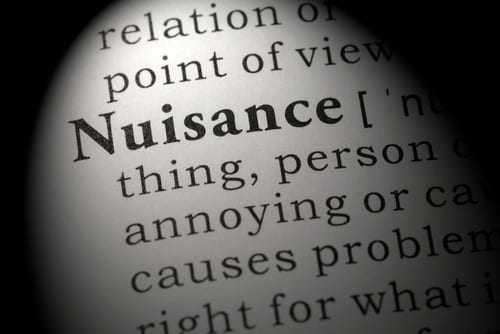Recent Blog Posts
Existing Tenants and Rule Enforcement for New Landlords
 Buying a multi-unit building that is already occupied is likely one of the simplest ways to become a landlord or expand your business. However, working with existing tenants can be challenging if the previous landlord was not so concerned with keeping the property well-maintained and enforcing policies set out in the lease. If you have found yourself in a situation where you have tenants who do not respect the terms of a lease you did not write but now own, you may be faced with backlash when trying to create a nicer community. Evicting existing tenants may eventually become necessary. A DuPage County, IL landlord representation attorney may be able to help you.
Buying a multi-unit building that is already occupied is likely one of the simplest ways to become a landlord or expand your business. However, working with existing tenants can be challenging if the previous landlord was not so concerned with keeping the property well-maintained and enforcing policies set out in the lease. If you have found yourself in a situation where you have tenants who do not respect the terms of a lease you did not write but now own, you may be faced with backlash when trying to create a nicer community. Evicting existing tenants may eventually become necessary. A DuPage County, IL landlord representation attorney may be able to help you.
Common Issues When Working With Existing Tenants and When to Evict
“I know it is in the lease, but the old landlord never cared” is a phrase you may quickly tire of hearing. Problems you might encounter as the new landlord of an already-occupied building may include:
Defending Multiple Criminal Charges in Illinois
 It is common for a person who gets arrested to be charged with more than one criminal offense. This is especially true if your arrest stemmed from a traffic stop. People may get pulled over for a mundane reason, like speeding or having a taillight out, only for the police to discover that the person appears to be under the influence of drugs. Then, while making a DUI arrest, the police search the vehicle and discover that the person is also in possession of drugs. Now, the arrestee is facing both a DUI and a possession charge. If the person being arrested is, in fact, quite under the influence and cannot calm down and submit to the officers, now they are also charged with resisting arrest on top of the other two charges. If you are facing multiple criminal charges in Illinois, the situation is not hopeless, but it is important to contact a skilled Naperville, IL criminal defense lawyer immediately.
It is common for a person who gets arrested to be charged with more than one criminal offense. This is especially true if your arrest stemmed from a traffic stop. People may get pulled over for a mundane reason, like speeding or having a taillight out, only for the police to discover that the person appears to be under the influence of drugs. Then, while making a DUI arrest, the police search the vehicle and discover that the person is also in possession of drugs. Now, the arrestee is facing both a DUI and a possession charge. If the person being arrested is, in fact, quite under the influence and cannot calm down and submit to the officers, now they are also charged with resisting arrest on top of the other two charges. If you are facing multiple criminal charges in Illinois, the situation is not hopeless, but it is important to contact a skilled Naperville, IL criminal defense lawyer immediately.
6 Ways Illinois Residents Can Still Get in Trouble for Cannabis
 Recreational cannabis use has been legal for adults over 21 years old in Illinois for years now. Legalization was widely regarded as a step towards reducing the number of people who are incarcerated for very minor drug crimes. Most people can purchase, possess, and use reasonable amounts of marijuana legally. However, there are still situations where an Illinois resident can face criminal prosecution for cannabis-related crimes. THC products are generally legal but regulated. If you have been arrested in Illinois for a cannabis charge, it is important to consult with a DuPage County drug crimes attorney immediately. Some charges can even be considered felonies.
Recreational cannabis use has been legal for adults over 21 years old in Illinois for years now. Legalization was widely regarded as a step towards reducing the number of people who are incarcerated for very minor drug crimes. Most people can purchase, possess, and use reasonable amounts of marijuana legally. However, there are still situations where an Illinois resident can face criminal prosecution for cannabis-related crimes. THC products are generally legal but regulated. If you have been arrested in Illinois for a cannabis charge, it is important to consult with a DuPage County drug crimes attorney immediately. Some charges can even be considered felonies.
Types of Cannabis Offenses Still Prosecuted in Illinois
A few ways Illinois residents and visitors to the state can get arrested and charged with a crime related to marijuana include:
When is Retail Theft a Felony in Illinois?
 In Illinois, retail theft can be charged as a felony under certain circumstances. Illinois states retail theft as the act of taking possession of, carrying away, or transferring any merchandise displayed for sale in a retail establishment with the intention of not paying for the item. If you are facing charges related to retail theft, discuss your case with a lawyer to ensure you can obtain a robust defense to fight the charges you are facing adequately.
In Illinois, retail theft can be charged as a felony under certain circumstances. Illinois states retail theft as the act of taking possession of, carrying away, or transferring any merchandise displayed for sale in a retail establishment with the intention of not paying for the item. If you are facing charges related to retail theft, discuss your case with a lawyer to ensure you can obtain a robust defense to fight the charges you are facing adequately.
When Does Retail Theft Become a Felony?
Several factors can elevate a retail theft offense to a felony charge:
Potential Defense Strategies When Charged with Assault
 Being charged with a violent crime like assault in Illinois can be a frightening thing, especially for those without experience dealing with the criminal justice system. However, even when charged with a violent crime, it is important to understand and take advantage of the various defense strategies that may be used to help fight and possibly defeat the charges you are facing. Contact an experienced criminal defense lawyer to ensure you have the legal guidance of a professional with experience defending clients against charges related to violent crime.
Being charged with a violent crime like assault in Illinois can be a frightening thing, especially for those without experience dealing with the criminal justice system. However, even when charged with a violent crime, it is important to understand and take advantage of the various defense strategies that may be used to help fight and possibly defeat the charges you are facing. Contact an experienced criminal defense lawyer to ensure you have the legal guidance of a professional with experience defending clients against charges related to violent crime.
Here Are Defense Strategies to Be Aware Of
-
Self-defense – Of course, when dealing with an assault charge, one of the most common defenses is self-defense. If you can establish that you acted in self-defense, meaning you reasonably believed that you were in imminent danger of harm, you may be able to have the charges against you reduced or dismissed. To pursue this line of defense, it will be essential you provide evidence, such as witness testimonies or video footage, to support your claim. Additionally, demonstrating that your use of force was proportionate to the threat you were facing is something that can help strengthen your defense.
Understanding the Causes for Eviction in Illinois
 Eviction can be a complex and sensitive issue for both landlords and tenants. In Illinois, landlords must adhere to specific laws and regulations when seeking to evict a tenant. If you are a landlord looking for legal assistance regarding evicting a tenant, an eviction attorney for landlords can help you make this possible. By contacting a landlord eviction lawyer, you can understand your rights and responsibilities regarding this civil litigation process associated with landlord evictions in the state.
Eviction can be a complex and sensitive issue for both landlords and tenants. In Illinois, landlords must adhere to specific laws and regulations when seeking to evict a tenant. If you are a landlord looking for legal assistance regarding evicting a tenant, an eviction attorney for landlords can help you make this possible. By contacting a landlord eviction lawyer, you can understand your rights and responsibilities regarding this civil litigation process associated with landlord evictions in the state.
Five Causes for Eviction in Illinois
-
Nonpayment of rent – One of the most common reasons for eviction is when a tenant fails to pay rent on time or consistently falls behind on payments. Landlords have the right to pursue eviction proceedings if the tenant fails to fulfill their financial obligations.
Do Realistic Defense Strategies Exist for Fighting Speeding Tickets?
 Receiving a speeding ticket can be downright annoying but also costly. If you have received a speeding ticket, it is important to remember that you have legal rights and options to defend yourself. If you are wondering whether realistic defense strategies exist when looking to fight a speeding ticket, the good news is that defense strategies do exist and can be an essential factor in fighting the charges or even having them dismissed. However, implementing these strategies is easier said than done, making acquiring a lawyer necessary.
Receiving a speeding ticket can be downright annoying but also costly. If you have received a speeding ticket, it is important to remember that you have legal rights and options to defend yourself. If you are wondering whether realistic defense strategies exist when looking to fight a speeding ticket, the good news is that defense strategies do exist and can be an essential factor in fighting the charges or even having them dismissed. However, implementing these strategies is easier said than done, making acquiring a lawyer necessary.
Challenging Radar or Laser Accuracy
One common defense strategy in Illinois speeding cases is to present challenges to the accuracy of the radar or laser device used to measure speed. This involves questioning the calibration, maintenance, and proper usage of equipment. Requesting the officer’s training records and maintenance logs can help identify potential errors or inconsistencies. If you can establish doubts about the accuracy of the speed measurement, it may weaken the prosecution’s case and increase your chances of a favorable outcome.
Retail Theft Defense Strategies This Holiday Season
 The Christmas season is upon us, which means the hustle and bustle of holiday shopping can sometimes lead to misunderstandings or false accusations of retail theft. Suppose you have found yourself facing retail theft charges in Illinois during this festive time. In that case, it is crucial to implement an effective defense strategy in order to protect your rights and reputation. Contact a lawyer; they will have the legal knowledge and skills required to develop and implement a robust legal defense on your behalf.
The Christmas season is upon us, which means the hustle and bustle of holiday shopping can sometimes lead to misunderstandings or false accusations of retail theft. Suppose you have found yourself facing retail theft charges in Illinois during this festive time. In that case, it is crucial to implement an effective defense strategy in order to protect your rights and reputation. Contact a lawyer; they will have the legal knowledge and skills required to develop and implement a robust legal defense on your behalf.
Four Defense Strategies for Retail Theft Charges in Illinois
Work with your attorney to see whether any of these defense strategies are worth implementing in your case, including:
What Do Drug Manufacturing Charges Entail in Illinois?
 Drug manufacturing charges are serious offenses that carry severe penalties in the state of Illinois. Many people have a general idea of what illegal drug manufacturing is through movies and other forms of media, but what do such charges actually entail? If you are facing drug manufacturing charges, you are implored to seek legal help right away. Without the guidance of a lawyer, you are opening yourself up to making your legal problems even worse.
Drug manufacturing charges are serious offenses that carry severe penalties in the state of Illinois. Many people have a general idea of what illegal drug manufacturing is through movies and other forms of media, but what do such charges actually entail? If you are facing drug manufacturing charges, you are implored to seek legal help right away. Without the guidance of a lawyer, you are opening yourself up to making your legal problems even worse.
Legal Definition of Drug Manufacturing
Drug manufacturing refers to the process of producing, cultivating, or synthesizing controlled substances, such as meth, cocaine, heroin, or LSD, with the intention of distributing or selling them. This can involve operations such as meth labs, growing cannabis plants, or setting up undercover laboratories to produce illegal drugs.
DuPage County Prepares for Thanksgiving DUIs
 As Thanksgiving approaches and the rest of the holiday season, DuPage County, Illinois, like many other areas, prepares for an increase in DUI (Driving Under the Influence) incidents. Law enforcement agencies and local authorities are taking proactive measures to ensure road safety during this holiday season. If you are arrested for DUI, you are strongly advised to contact a criminal defense lawyer. While hiring a lawyer will not guarantee a positive end to your legal situation, it will give you a fair chance at pursuing a favorable conclusion to your current legal woes.
As Thanksgiving approaches and the rest of the holiday season, DuPage County, Illinois, like many other areas, prepares for an increase in DUI (Driving Under the Influence) incidents. Law enforcement agencies and local authorities are taking proactive measures to ensure road safety during this holiday season. If you are arrested for DUI, you are strongly advised to contact a criminal defense lawyer. While hiring a lawyer will not guarantee a positive end to your legal situation, it will give you a fair chance at pursuing a favorable conclusion to your current legal woes.
Holiday Season Means Increased Police Presence
DuPage County law enforcement agencies are increasing patrols and may implement sobriety checkpoints during the Thanksgiving holiday. The goal here is to deter impaired driving and catch those who are allegedly driving under the influence of alcohol or drugs. The heightened police presence serves as an important reminder to motorists to make responsible choices and avoid driving while impaired.





